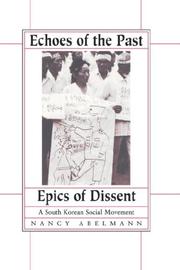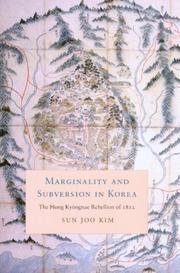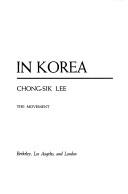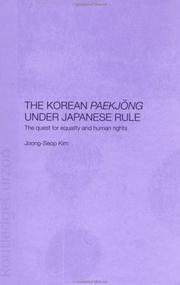| Listing 1 - 10 of 18 | << page >> |
Sort by
|
Book
ISBN: 9788964680650 Year: 2014 Publisher: Cheonan City The Institute of Korean Independence Movement Studies
Abstract | Keywords | Export | Availability | Bookmark
 Loading...
Loading...Choose an application
- Reference Manager
- EndNote
- RefWorks (Direct export to RefWorks)

ISBN: 0520204182 0520085906 Year: 1996 Publisher: Berkeley, Calif. : University of California Press,
Abstract | Keywords | Export | Availability | Bookmark
 Loading...
Loading...Choose an application
- Reference Manager
- EndNote
- RefWorks (Direct export to RefWorks)
Social movements --- Tenant farmers --- -Land tenure --- -Social movements. --- K9309 --- K9324.40 --- K9420 --- K9424 --- Movements, Social --- Social history --- Social psychology --- Agrarian tenure --- Feudal tenure --- Freehold --- Land ownership --- Land question --- Landownership --- Tenure of land --- Land use, Rural --- Real property --- Land, Nationalization of --- Landowners --- Serfdom --- Farmers --- Farm tenancy --- Case studies. --- Korea (South) --- -Korea: Social sciences, society -- social theory, movements and protests --- Korea: Communities, social classes and groups -- farmers --- Korea: Economy and industry -- agricultural industries --- Korea: Economy and industry -- land and real estate --- Land tenure --- Propriété foncière --- Mouvements sociaux --- Métayers --- Case studies --- Political activity --- Cas, Etudes de --- Activité politique --- Korea: Social sciences, society -- social theory, movements and protests

ISBN: 9780295986845 0295986840 9780295989310 0295989319 029580338X 9780295803388 Year: 2007 Publisher: Seattle: University of Washington press,
Abstract | Keywords | Export | Availability | Bookmark
 Loading...
Loading...Choose an application
- Reference Manager
- EndNote
- RefWorks (Direct export to RefWorks)
Hong Kyong-nae Incident, 1811-1812 --- Korea --- History --- K9155 --- K9300.50 --- K9309 --- Korea: History -- late Chosŏn period, isolation, Qing dependency (1600-1895), Manchu invasions (1627, 1637) --- Korea: Social sciences -- social and cultural history -- Chosŏn period (1392-1910) --- Korea: Social sciences, society -- social theory, movements and protests --- Hong Kyŏng-nae Incident, 1811-1812 --- Korea - History - 1637-1864 --- Hong Kyŏng-nae Incident, 1811-1812.

ISBN: 0520020804 0520022742 Year: 1992 Publisher: Berkeley University of California press
Abstract | Keywords | Export | Availability | Bookmark
 Loading...
Loading...Choose an application
- Reference Manager
- EndNote
- RefWorks (Direct export to RefWorks)
K9309.90 --- K9045.90 --- Communism --- -Communism --- -Bolshevism --- Communist movements --- Leninism --- Maoism --- Marxism --- Trotskyism --- Collectivism --- Totalitarianism --- Post-communism --- Socialism --- Village communities --- Korea: Social sciences, society -- social theory, movements and protests -- North Korea --- Korea: Philosophy and thought -- schools -- Marxism, Maoism, communism, socialism -- North Korea, juch'e --- History --- History. --- -History
Book
ISBN: 9788952113122 8952113128 Year: 2012 Publisher: Seoul: Seoul national university press,
Abstract | Keywords | Export | Availability | Bookmark
 Loading...
Loading...Choose an application
- Reference Manager
- EndNote
- RefWorks (Direct export to RefWorks)
Civilization, Oriental --- Civilization --- Arts --- Philosophy --- K9309 --- K9300.80 --- J4291 --- Korea: Social sciences, society -- social theory, movements and protests --- Korea: Social sciences -- social and cultural history -- modern period, postwar period (1945- ) --- Asia: Sociology, anthropology and culture --- Civilization, Oriental - Philosophy --- Civilization - Philosophy --- Arts - Philosophy
Book
ISBN: 0804794308 9780804794305 9780804791465 0804791465 1503610128 Year: 2015 Publisher: Stanford, California
Abstract | Keywords | Export | Availability | Bookmark
 Loading...
Loading...Choose an application
- Reference Manager
- EndNote
- RefWorks (Direct export to RefWorks)
1970s South Korea is characterized by many as the "dark age for democracy." Most scholarship on South Korea's democracy movement and civil society has focused on the "student revolution" in 1960 and the large protest cycles in the 1980s which were followed by Korea's transition to democracy in 1987. But in his groundbreaking work of political and social history of 1970s South Korea, Paul Chang highlights the importance of understanding the emergence and evolution of the democracy movement in this oft-ignored decade. Protest Dialectics journeys back to 1970s South Korea and provides readers with an in-depth understanding of the numerous events in the 1970s that laid the groundwork for the 1980s democracy movement and the formation of civil society today. Chang shows how the narrative of the 1970s as democracy's "dark age" obfuscates the important material and discursive developments that became the foundations for the movement in the 1980s which, in turn, paved the way for the institutionalization of civil society after transition in 1987. To correct for these oversights in the literature and to better understand the origins of South Korea's vibrant social movement sector this book presents a comprehensive analysis of the emergence and evolution of the democracy movement in the 1970s.
Social movements --- Protest movements --- Political persecution --- Authoritarianism --- Political science --- Authority --- Political repression --- Repression, Political --- Persecution --- Civil rights --- Movements, Social --- Social history --- Social psychology --- History --- Korea (South) --- Politics and government --- K9300.80 --- K9309 --- Korea: Social sciences -- social and cultural history -- modern period, postwar period (1945- ) --- Korea: Social sciences, society -- social theory, movements and protests
Book
ISBN: 9780295745633 0295745630 9780295745640 0295745649 9780295746333 0295746335 Year: 2019 Publisher: Seattle : University of Washington Press,
Abstract | Keywords | Export | Availability | Bookmark
 Loading...
Loading...Choose an application
- Reference Manager
- EndNote
- RefWorks (Direct export to RefWorks)
Suicide and martyrdom are closely intertwined with Korean social and political processes. In this first book-length study of the evolving ideals of honorable death and martyrdom from the Chosŏn Dynasty (1392–1910) to contemporary South Korea, interdisciplinary essays explore the changing ways in which Korean historical agents have considered what constitutes a sociopolitically meaningful death and how the surviving community should remember such events.Among the topics covered are the implications of women’s chaste suicides and men’s righteous killings in the evolving Confucian-influenced social order of the latter half of the Chosŏn Dynasty; changing nation-centered constructions of sacrifice and martyrdom put forth by influential intellectual figures in mid-twentieth-century South Korea, which were informed by the politics of postcolonial transition and Cold War ideology; and the decisive role of martyrdom in South Korea’s interlinked democracy and labor movements, including Chun Tae-il’s self-immolation in 1970, the loss of hundreds of lives during the Kwangju Uprising of 1980, and the escalation of protest suicides in the 1980s and early 1990s.
Suicide --- Death --- Martyrdom --- K9342.90 --- K9309 --- Suffering --- Martyrs --- Dying --- End of life --- Life --- Terminal care --- Terminally ill --- Thanatology --- Killing oneself --- Self-killing --- Right to die --- History --- Korea: Social policy and pathology -- suicide --- Korea: Social sciences, society -- social theory, movements and protests --- Religious aspects --- Philosophy --- Causes --- Korea --- Civilization. --- Politics and government. --- Martyrdom. --- History.
Book
ISBN: 9789004185036 Year: 2010 Publisher: Leiden Brill
Abstract | Keywords | Export | Availability | Bookmark
 Loading...
Loading...Choose an application
- Reference Manager
- EndNote
- RefWorks (Direct export to RefWorks)
Social Darwinism --- Nationalism --- Darwinisme social --- Nationalisme --- Korea --- Corée --- Social policy --- History --- Politique sociale --- Histoire --- K9300.60 --- K9309 --- K9310.20 --- Korea: Social sciences -- social and cultural history -- modern period (1860s-[1945]), 20th century general --- Korea: Social sciences, society -- social theory, movements and protests --- Korea: Society, social psychology and social-anthropological phenomena (South) Korea -- nationalism --- Corée --- Darwinism, Social --- Competition --- Social change --- Social conflict --- Social evolution --- Social policy.

ISBN: 113578759X 1280071338 9786610071333 0203417771 9780203417775 9781135787592 6610071330 0700717072 9780700717071 9781135787547 1135787549 9781135787585 1135787581 9781138863460 1138863467 9781280071331 Year: 2003 Publisher: London Routledge/Curzon
Abstract | Keywords | Export | Availability | Bookmark
 Loading...
Loading...Choose an application
- Reference Manager
- EndNote
- RefWorks (Direct export to RefWorks)
Traditional Korean society was characterized by a rigid hierarchy. The minority Paekjong were the lowest group of the lowest rank of the shinbun class system, and were treated as outcasts throughout the Choson period (1392-1910). This book deals with their historical and social background, and their struggle for human rights and equality in colonial Korea through the activities of the Hyongpyongsa (Association for an Equitable Society), active from c.1923 to 1935. The Hyongpyongsa was the longest-lasting social movement during the colonial period, and its activities provoked confronta
Social classes --- Social movements --- Discrimination --- Bias --- Interpersonal relations --- Minorities --- Toleration --- History. --- Hyŏngp'yŏngsa (Association) --- Kōheisha (Association) --- 형평사 (Association) --- Korea --- Social conditions --- K9300.70 --- K9309 --- K9321.80 --- History --- Korea: Social sciences -- social and cultural history -- Japanese annexation period (1905-1945) --- Korea: Social sciences, society -- social theory, movements and protests --- Korea: Communities, social classes and groups -- paekchǒng, outcasts --- Hyŏngpʻyŏngsa (Association) --- Hyongp'yongsa (Association)
Book
ISBN: 1498503209 0739190261 9780739190265 9780739190258 0739190253 9781498503204 Year: 2014 Publisher: Lanham, Maryland
Abstract | Keywords | Export | Availability | Bookmark
 Loading...
Loading...Choose an application
- Reference Manager
- EndNote
- RefWorks (Direct export to RefWorks)
This book examines the role of women involved in South Korea's democratization movement. Through its study of older women and the gender roles and values of Korean society manifested in the "Mothers" movement, this book challenges social movement theories that focus on those on the front line but ignore those behind the scenes.
Women --- Women and democracy --- Protest movements --- Social movements --- Democratization --- Democratic consolidation --- Democratic transition --- Political science --- New democracies --- Democracy and women --- Democracy --- Political activity --- Korea (South) --- Politics and government --- K9327 --- K9300.80 --- K9500.80 --- K9309 --- Korea: Communities, social classes and groups -- gender roles, women, feminism, men --- Korea: Social sciences -- social and cultural history -- modern period, postwar period (1945- ) --- Korea: Politics -- history -- modern period, postwar period (1945- ) --- Korea: Social sciences, society -- social theory, movements and protests
| Listing 1 - 10 of 18 | << page >> |
Sort by
|

 Search
Search Feedback
Feedback About UniCat
About UniCat  Help
Help News
News